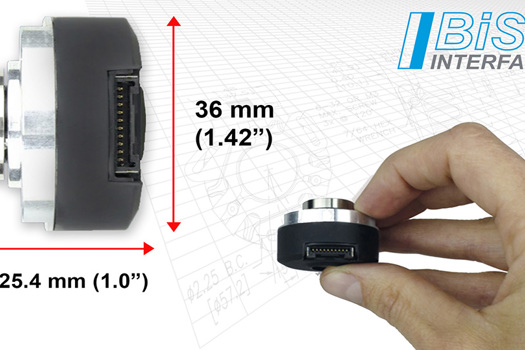The Model A36R Absolute Encoder is designed for high performance in a compact mechanical package. The use of blue LED and reflective technology along with excellent shock and vibration ratings make it a highly versatile encoder. Available with bore sizes up to 10 mm and a wide selection of flexible mounting options, with BiSS C or SSI communication protocols, it is especially suited to applications where an encoder needs to retain position information after power-off scenarios.
The Model A36R absolute thru-bore encoder offers:
- Up to 22-bit single turn / 24-bit multi-turn resolution
- Thru-bore or blind hollow-bore styles
- BiSS C and SSI communications
- 36 mm diameter housing, 25.4 mm (1.000" depth)
- Operating temperature range of -40° C to 120° C
- Optional battery/backup power interface for data retention in the absence of primary power
Reflective Technology
The central component of the reflective technology architecture is an innovative system-on-chip optical device. This device integrates a blue LED emitter and a sensor into a single package, accompanied by a range of on-chip programmable encoder functions. This technology offers significant benefits over the traditional optical transmissive approach:
Compact Design: Unlike transmissive technology, which necessitates two separate PCB assemblies, this technology requires only a single PCB assembly. This reduction in hardware complexity and space requirements is a notable advantage.
Signal Clarity and Precision: The inclusion of a blue LED with a short wavelength in the integrated package enhances signal contrast and minimizes jitter. Furthermore, the proximity of the emitter and sensor within the same assembly significantly reduces optical crosstalk.
Versatile Position Detection: Unlike many magnetic encoders that rely on magnets positioned at the end of the encoder shaft to detect position, this technology enables off-axis position detection. This versatility allows for a wider range of mounting options, including those suitable for thru-bore style shafts.











